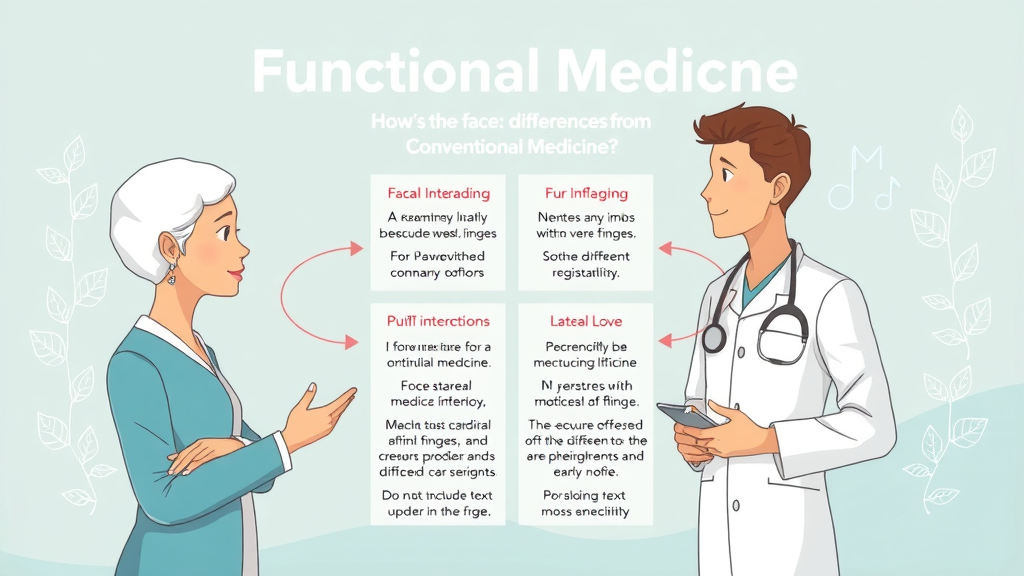- Discover the intricacies of insurance coverage when it comes to functional medicine.
Understanding Functional Medicine and Insurance
What is Functional Medicine?
- Explore the principles of functional medicine and how it differs from conventional medicine.

Functional medicine represents a personalized medical care approach that seeks to identify and treat the root causes of diseases. Unlike conventional medicine, which often focuses on symptom management, functional medicine prioritizes a holistic view of health, considering genetic, environmental, and lifestyle factors. This approach facilitates the creation of a personalized treatment plan aimed at both preventing and treating illness. The core principle of functional medicine centers around understanding the complex interactions that contribute to health and wellness, offering solutions that are highly tailored to individual patient needs. For those interested in exploring how gut health can impact overall wellness, you might find our article on gut health and inflammation insightful.
Do Functional Doctors Take Insurance?
- Analyze the current landscape and the challenges faced.
The question “Do functional doctors take insurance?” is common among patients exploring functional medicine. While some functional medicine doctors accept insurance, many do not, primarily due to the health insurance system’s limitations in reimbursing personalized treatment plans characteristic of functional practices. The disparity arises because functional medicine incorporates extensive consultations and personalized screenings which might not align with standard health insurance cover. Navigating this landscape necessitates a comprehensive understanding of both the health-care system and specific insurance policies.
Why Insurance May or May Not Cover Functional Medicine
- Factors influencing insurance coverage for functional medicine.

Several factors influence whether an insurance plan will cover functional medicine. Most prominently, the health-care framework often categorizes functional medicine services as non-essential or elective treatments, thus excluding them from typical coverage. Additionally, insurance companies typically prefer protocols standardized in conventional practices, such as specific lab test requirements, over the diagnostic diversity seen in functional medicine. Changes in policy and health care reforms could offer hope for future integration, but currently, high demand and limited standardization hinder comprehensive insurance acceptance.
Factors Affecting Insurance Coverage for Functional Medicine
The Role of Health Insurance
- Examine how health insurance policies impact coverage.
Health insurance plays a pivotal role in determining coverage for medical services, including those related to functional medicine. Traditional health plans often adhere to standardized practices, limiting coverage for personalized treatment plans used by functional medicine doctors. As functional medicine relies heavily on tailored treatment plans, many procedures, tests, and extended consultations fall outside typical coverage boundaries, leaving patients financially responsible. Understanding specific health plan provisions and discussing coverage options with both insurers and medical practitioners can help mitigate costs associated with functional medicine services.
Integrative Medicine: A Comparative Analysis
- Compare functional medicine with integrative medicine coverage.

Functional and integrative medicine may often appear interchangeable, yet insurance coverage for these practices can vary significantly. Integrative medicine blends conventional and functional practices, often enjoying broader acceptance by insurance companies due to its incorporation of standard medical procedures that are typically covered. In contrast, fully functional medicine practices may not meet the criteria for typical insurance reimbursement because of their comprehensive and non-standard approaches. Therefore, patients interested in such therapies must navigate both insurance specifications and the individualized nature of their treatment plans. For those looking to enhance their health journey, consider exploring AG1 Travel Packs for a convenient boost.
Navigating Insurance Policies for Functional Medicine
Steps to Take If Your Insurance Doesn’t Cover Functional Doctors
- Practical advice for dealing with insurance limitations.
If your insurance policy doesn’t cover functional doctors, taking proactive steps can significantly alleviate the financial burden. Start by reviewing specific insurance plan details to understand covered services, and then consider negotiating payment plans with your provider. Additionally, appeal to your insurance company by providing detailed documentation of your treatment plan, showcasing the necessity and potential cost-effectiveness of functional medicine. Exploring out-of-network benefits can also yield savings, making informed discussions with both insurers and practitioners crucial in navigating financial aspects of functional medical care.
Alternative Payment Options and Flexible Spending
- Explore flexible spending accounts and other financial options.

For those seeking functional medicine without insurance coverage, alternative payment methods can provide significant relief. Flexible Spending Accounts (FSAs) and Health Savings Accounts (HSAs) offer tax-advantaged ways to pay for medical expenses, allowing you to allocate pre-tax dollars for healthcare costs, including those not traditionally covered by insurance. Other options may include payment plans offered by functional doctors’ offices or financing programs to spread out expenses. The key is to weigh these options critically to ensure they align with personal financial circumstances while maximizing benefits.
People Also Ask
Will functional medicine ever be covered by insurance?
- Discuss potential changes in insurance policies for functional medicine.
The future of insurance coverage for functional medicine remains uncertain but hopeful. As awareness and demand for alternative health-care options grow, insurance companies might gradually adapt to accommodate such practices, possibly through pilot programs or expanded coverage for specific procedures. The evolving health system continues to re-evaluate cost-efficiency standards, and functional medicine’s emphasis on preventive care could become a compelling factor in insurance integration. Ultimately, policy shifts will depend on both consumer advocacy and economic evaluation.
What is the downside of functional medicine?
- Identify potential disadvantages and concerns.
Despite its personalized approach, functional medicine may have certain downsides. The most notable is the out-of-pocket cost, as lacking insurance coverage can make these services expensive. Additionally, the time investment needed for thorough evaluations and treatment plans might not be manageable for every patient. Skepticism from traditional medicine practitioners may also pose challenges, leading to delays in coordinated care. Nevertheless, understanding these potential drawbacks allows patients to weigh the pros and cons against the personalized and potentially transformative benefits that functional medicine can offer.
How much does it cost to see a functional doctor?
- Analyze typical costs associated with functional medicine consultations.
Appointments with functional medicine doctors typically vary in cost depending on the scope and complexity of the treatment plan. Initial consultations can range from $200 to $500 or more, depending on the practitioner’s expertise and location. Follow-up visits or specific lab tests, crucial for personalized treatment plans, could incrementally increase expenses. While these costs might seem substantial, the tailored and preventive nature of the care offered is often considered a worthwhile investment for those prioritizing long-term health benefits over short-term financial constraints.
Will my insurance cover a holistic doctor?
- Review coverage options for holistic and integrative doctors.

Insurance coverage for holistic and integrative doctors often varies significantly across different policies and providers. While some health insurance plans may cover specific therapies or visits, others might only offer limited benefits, viewing them as non-essential medical care. Patients are advised to confirm their insurance plan details, potentially appealing to insurance companies for more comprehensive coverage. Doing so necessitates a thorough understanding of the policies surrounding holistic and integrative medicine, offering better insights into available benefits.
In-depth Review of Coverage Options
Primary Care and Office Visits
- Assess coverage for office visits and primary care services.
Primary care forms the cornerstone of health care services, with insurance typically covering regular office visits. However, when these visits pertain to functional medicine, coverage might differ. Insurance plans often restrict office visits or reimbursements based on specific criteria that functional medicine practices may not meet. Consequently, policies generally cover essential or primary care services rather than in-depth functional examinations. Understanding this boundary allows patients to plan their visits and financial obligations better.
Insurance for Lab Tests and Lab Testing
- Evaluate insurance acceptance for lab tests related to functional medicine.
Many patients find themselves surprised by the limited coverage of their insurance for functional medicine.
Lab tests are pivotal in diagnosing and crafting personalized treatment plans within functional medicine. Despite their importance, many insurance companies might not cover these tests as they are deemed non-traditional, especially when tailored beyond standard diagnostics. Patients might face substantial out-of-pocket expenses for the specific lab testing integral to functional practices. Collaborating with health care providers can help identify alternative testing facilities or insurance expectations, aiding in managing financial impacts.
Conclusion and Final Thoughts
- Summarize insights and offer guidance for navigating insurance in functional medicine.
To navigate the complexities of insurance and functional medicine, understanding coverage limitations, potential expenses, and available financial resources is essential. Being well-informed allows for better decision-making in achieving personalized, meaningful health care.
Explore Further with Our Comprehensive Resources
- Encourage readers to delve deeper with additional resources and professional consultations.
Equip yourself with the knowledge and resources to make informed health-care choices. Explore further with our detailed guides and consult with professional advisers to make the most of your functional medicine journey.
 Add Row
Add Row  Add
Add 



Write A Comment